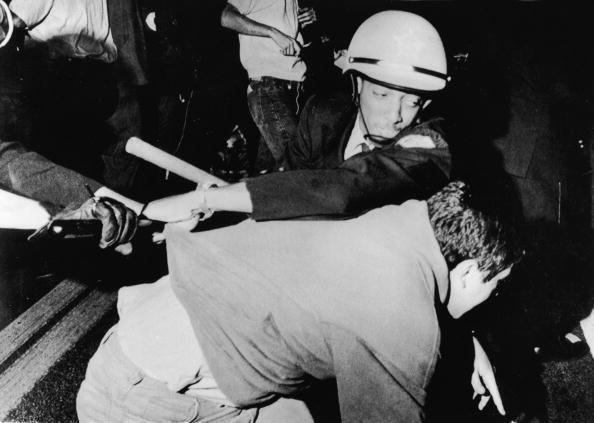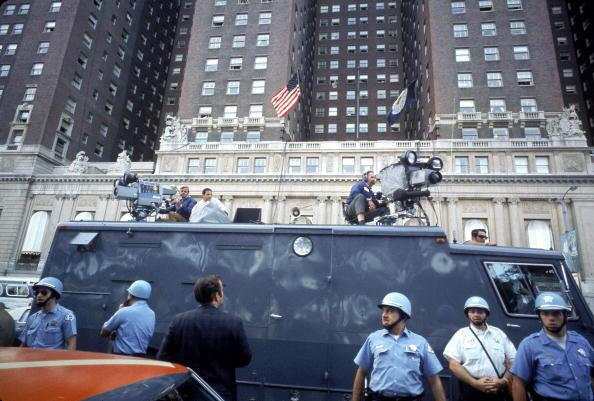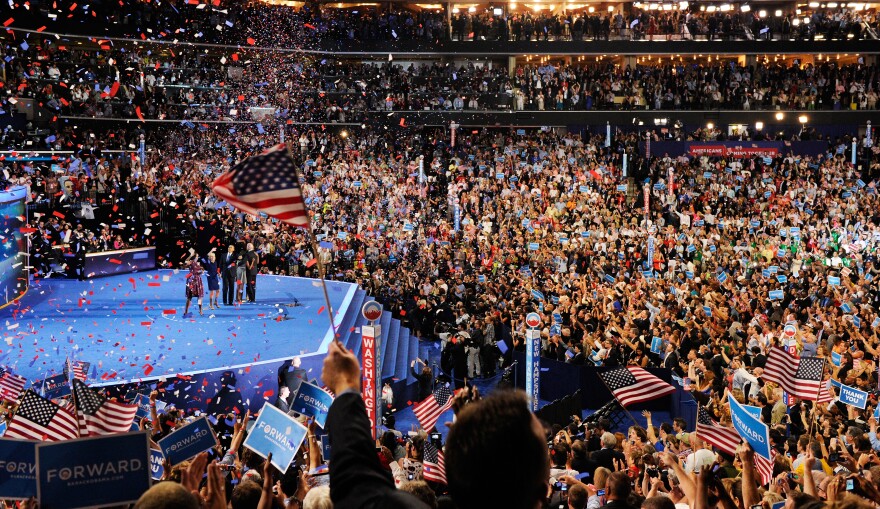A look at the country's history with conventions, what to do when confronted by someone who's possibly unstable and may be dangerous, Twitter's NFL streaming deal.
Riots, scuffles, billy clubs: Contested conventions can get pretty wild
It's primary day in Wisconsin, and neither GOP front-runner Donald Trump nor Democratic leader Hillary Clinton is expected to walk away with a win.
For Democrat Bernie Sanders, a victory in "Forward" state could give him a much-needed delegate boost.
For Republicans, however, a win by runner-up Ted Cruz will bring little clarity to the deeply-divided conservative party.
If Cruz emerges victorious, it would be significantly more difficult for Donald Trump to lock in enough delegates to claim the nomination before the party's July convention in Cleveland. That would mean a bare-knuckle battle for delegates, all taking place in view of TV cameras and thousands of reporters.
It's a journalist's dream, and a political party's nightmare: a contested convention.
Few in the political arena now have been around long enough to remember the last time either party saw campaigns carry into the convention. As a result, it's hard to predict just how a contested convention might look.
To gain a deeper understanding of the country's history with conventions, Take Two took a look back with Dan Schnur, director of the Jesse M. Unruh Institute of Politics at USC.
1968 Democratic Convention
Where: Chicago, Illinois
Candidates: Hubert Humphrey vs. Eugene McCarthy
Tasting notes: Riots, police crackdown, assassinations, political insiders
The Vietnam War was entering its third year when incumbent Democratic President Lyndon B. Johnson announced that he would not be running for another term. Days later, Massachusettes Senator and presidential hopeful Bobby Kennedy was shot and killed at the Ambassador Hotel. Johnson's vice president, Hubert Humphrey, was chosen as the establishment favorite. That didn't sit well with many at the convention, says Dan Schnur.
"At that point, the Democratic Party had been ripped apart," Schnur said. "Johnson's decision not to seek re-election ... Kennedy's assassination and Eugene McCarthy's insurgent candidacy fueled by very fervent opposition to the Vietnam War left the Democratic Party in tatters, from which it took several years and several election cycles to recover."
Chicago Mayor Richard Daley, an ardent member of the Democratic Party establishment, took it upon himself to ensure that Hubert Humphrey received the party's nomination, using the Chicago Police Department to crack down on dissenters outside the convention, and bully delegates on the floor. Schnur says footage of police officers beating protesters with clubs had a — predictably — negative impact on the image of the Democratic party.
"The divisiveness and the violence of 1968, followed by George McGovern's candidacy in 1972, really created an opportunity for the Republicans for the next — almost twenty years — to dominate politics at the presidential level," Schnur said. "Only Jimmy Carter's election — in the immediate aftermath of Watergate — was the only Democratic elected president in that period."


1976 Republican Convention
Where: Kansas City, Missouri
Candidates: Gerald Ford vs. Ronald Reagan
Tasting notes: Stirring orations, delegate wooing
The 1976 Republican Convention was considerably more civil than the Democratic contest years earlier. Ronald Reagan and Gerald Ford had both fared well in the primaries, but neither had a firm majority. Both candidates came to Kansas City hoping to persuade uncommitted delegates to give their support. After much cajoling, it became apparent that Gerald Ford was going to come out on top. Before departing, however, Ronald Reagan delivered an oration that arguably eclipsed Ford's acceptance speech.
https://www.youtube.com/watch?v=_eSmfldz_bA
Dan Schnur says Reagan's concession speech had the desired effect: the party was left intact, and he (Reagan) still came out a winner.
"For all practical purposes, Ronald Reagan's speech at the 1976 Republican Convention may as well have been his announcement speech for the 1980 election," Schnur said. "There was no question that when Reagan departed from the stage that night, that he was going to be the Republican nominee at some point in the future."
He adds that Ford lost that election — in part — because few voters were particularly excited for the candidate.
2016 Republican Convention
Where: Cleveland, Ohio
Candidates: TBA
Tasting notes: TBA
Looking to a possible contested or brokered convention this presidential election year, Schnur contends that the past offers few hints about which way candidates and delegates might turn.
"The examples we've been citing have come before social media, before the internet, before cable television," Schnur said. "I think what you can learn from those prior examples is what a party needs to do after a very public, bitter, divisive fight ... how a party rebuilds itself, how it reunites — or doesn't — going forward once the convention is concluded."
Press the blue play button to hear the interview, complete with clips from the conventions.
Featured songs:
"For What it's Worth," by Buffalo Springfield (1967)
"A Fifth of Beethoven," by Walter Murphy (1976)
CORRECTION: A previous version of this article stated that Sen. Bernie Sanders could receive a 96-point boost from Wisconsin. We regret the error.
Fresno has a special election Tuesday: Here's why it matters to California
While people head to polls in Wisconsin on Tuesday, some voters will also be casting ballots in California.
Fresno is holding a special election to fill the seat of former Democratic Assemblyman Henry Perea. He took a job in December as a Sacramento lobbyist for the pharmaceutical industry.
While it seemed this seat was safe for the Democrats, the outcome of this election is not guaranteed.
Laurel Rosenhall of Cal Matters tells more about how this vote might echo throughout California.
Read Laurel Rosenhall's piece: "What happens when a legislator quits?"
What to do when you encounter someone in a full mental health crisis
On Saturday afternoon, a man was brutally beaten while walking down the street in downtown Los Angeles. He was punched, kicked and left bleeding on the sidewalk. The attack was only stopped when a security guard at the nearby Whole Foods intervened.
The victim, who is a senior, is in critical condition.
The perpetrator is a mentally unstable transient who was arrested and charged with attempted murder. Whether he's mentally stable enough to understand his actions, let alone stand trial for them, is another matter.
The violence of this incident is uncommon but as anyone who frequents downtown, which is home to L.A.'s Skid Row, can confirm: encountering homeless people who are mentally ill, on drugs, or both does happen.
After the attack last weekend, people are understandably nervous.
While not everyone who is mentally unstable is dangerous, Joey Aguilar from the Skid Row Housing Trust, which provides services including housing and mental health care, has a few tips to stay safe.
- Prioritize removing yourself from a situation where you see someone is agitated, raising their voice or invading your personal space.
- Don't be a superhero and cross the street if necessary to create more distance between you and the other person. Trust your gut if it feels unsafe.
- Resist the urge to calm or reason with an agitated person, and remain calm and collected yourself. Leave it to the professionals.
- Call 911 if the situation is life-threatening. If you are in near Skid Row, you can also call an outreach team at 213.680.6333. Each team is staffed by a mental health specialist, a nurse, a substance abuse counselor and more.
- Describe the situation and emphasize you're calling for help.
- If you are able to wait for the responders, stay at a safe distance and do not attempt to engage or subdue a person.
- The best way to help a person who seems mentally ill is to get involved with a local agency that provides support and solutions to them, such as the Skid Row Housing Trust
How to talk with kids about healthy eating? Nutritionists weigh in
Getting kids to eat healthy foods can sometimes feel like a losing battle.
Some parents struggle to get their kids to eat anything. Others worry about their kids eating too much. For some families, healthy food options can be hard to come by.
And there's cause for concern. In California, one in six kids is significantly overweight. In L.A. County, 19 percent of 2 to 4 year olds from low-income families are obese.
So what's the best way for parents to talk with their kids about nutrition and start them off early with good eating habits?
Cynthia Epps, an infant feeding nutritionist and board certified lactation consultant, and Melissa Halas-Liang, a registered dietician and nutritionist with the California Academy of Nutrition and Dietetics, offered some tips:
Think about how you talk about food
When you're talking with kids, talk about nutrition in terms of 'eat the foods that make you think your best, jump your highest, run the fastest' and really focus on health instead of overemphasizing or labeling foods as good or bad.
Introduce healthy foods early on
Before a child even starts eating solid meals, parents can use a method called 'tiny tastes.' It involves putting the taste of healthy foods, like broccoli and kale, on their baby's lips. That sets up their brain to accept these foods more readily later on.
Presentation is key
Sometimes kids won't eat raw or even cooked zucchini, but if you spiralize it, they may be more likely to try it. Kids who won't eat cooked corn might like it as a frozen snack. You can try different presentation styles and see what might work for your kid.
Get kids involved in the process
Part of it is about getting kids empowered. If you offer kids options, like peppers and carrots, and let them choose what they like, they'll eat more of the healthy food they choose. Getting kids involved in cooking (even if it's just a microwave meal) will make them much more likely to try that food too.
Look beyond the calorie count
If you're going to look at calorie counts on packaged foods, you really want to look at the sugar and the fiber content. Those are a little more important than the actual calories because of how that balances how that particular food is going to be metabolized.
To hear the full interview, click the link above.
Panama Papers implicate thousands of the world's wealthy, but few Americans
The Panama Papers have claimed their first political victim.
Today, Iceland's prime minister resigned. He was one of many whose names showed up in a mass of leaked documents that offer a look at the inner workings of tax shelters and so-called offshore shell companies.
Over 11.5 million financial records were leaked from a Panamanian law firm to a German newspaper in 2014.
The documents point to other high profile individuals attempts to shield large sums of money, including the president of Ukraine, associates of Russian President Vladimir Putin, and even pro athletes such as soccer star Lionel Messi.
But one group has been noticeably absent from the Panama Papers: Americans.
Just 211 US addresses have been found in the data — a small sliver of the massive data dump, which raises the question: Where are Americans putting their money?
Well, as it turns out, Americans don't need to store their money overseas — several states offer similar levels of secrecy.
Take Two talked about it with Shima Baughman. She's a professor of international law at the University of Utah and was one of the original reviewers of the Panama Papers.
Press the blue play button above to hear the interview.
Twitter scores bid for NFL Thursday night games
This fall, the NFL Thursday night games will have a new home— Twitter.
NFL commissioner Roger Godell made the announcement today— on Twitter, of course— that the social media company won out in a bidding war against other big names in tech including Verizon, Facebook, Amazon, and Yahoo.
Twitter will stream 10 NFL games in their entirety on their site for free to both registered and unregistered users.
Under pressure from investors to bolster member growth, the move is seen as an attempt to reach out to younger fans who don’t have televisions.
For more on the details of the deal and what this means for the two companies, Take Two's A Martinez spoke to Peter Kafka, senior editor at Re/code covering media and technology.
Tuesday Reviewsday: Fitz and the Tantrums, Darling James and more
Music writer Nic Harcourt joins Take Two host A Martinez for Take Two's weekly new music installment - Tuesday Reviewsday.
What's on Nic's playlist?
Artist: Fitz and the Tantrums
Song: Handclap
Summary: LA’s own Fitz and the Tantrums have announced a new self titled studio album, which will drop on June 10th. The lead single is called “HandClap." The song is a primal tale of love and lust, a call to arms in the late hours of the night,” says lead vocalist Fitz. “It’s the X-rated version of ‘Eternal Sunshine of the Spotless Mind’ happening on a dance floor. Fitz and company will support the new album with an extensive summer tour.
Artist: Darling James
Song: “The Itch”
Summary: On his second single under the moniker Darling James Melbourne-based songwriter James O'Brien (ex-frontman of The Boat People) tackles this question in a stomping, fizzing self-produced pop adventure titled 'The Itch."
Filled with falsetto vocals, an incessant staccato drum figure and loaded with atmospherics, the track conjures up a sense of urgency and surrender: no matter how big we think or how long we ruminate, "The Itch" reminds us that the patchwork of needs and urges that make us human have a habit of dragging us back to earth.
His debut single last summer 'Ultimatum Talk' marked the start of Darling James' journey with a colossal bang, snagging a triple j rotation add and clocking over 100k plays on Spotify. With a debut EP to be unveiled later in the year.
Artist: the Rubens.
Songs: "Hallelujah"; "Hoops"
Album: Hallelujah
Summary: The Rubens are a five-piece alternative rock band originally from Menangle, New South Wales. The band comprises the three Margin brothers, Zaac, Sam and Elliott, and friends Scott Baldwin and William Zeglis. Their debut self-titled album The Rubens gained them domestic success with it reaching No. 3 on the ARIA Charts and being nominated for a J Award for Album of the Year. In May 2015, the band released the lead single from their second album, called "Hallelujah."
The follow-up single from the album, the title track "Hoops", reached number 25 on the ARIA Singles Chart in 2015 and was voted number one in the Triple J Hottest 100 of 2015 The album with both these tracks was just released here in the U.S.
Artist: Black Mountain
Song: Florian Saucer Attack
Album: IV
Summary: For most rock bands, naming an album IV may imply a lack of imagination, but coming from such studious classic-rock scholars as Black Mountain, it's a gesture loaded with significance. As history has shown, hard-rock bands tend to view their discographies like batting orders, and—whether officially or otherwise— a numerically branded "IV" has come to represent the clean-up hitter stepping up to the plate with the bases loaded. It's the moment where bands capitalize on established strengths and set out for parts unknown.
And Black Mountain's IV plays the fourth-album role to a tee, rolling up the weed-scented riffage of their 2005 self-titled debut, the prog-sized ambitions of In the Future, and the pop-focussed finesse of Wilderness Heart, all while embracing electronics with a zeal that suggests the band's relationship with modern music has become somewhat less tortured.




